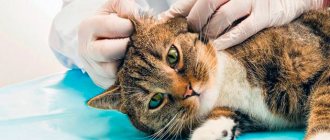If the owner notices that his cat is yelling in a bad voice at night, this situation should not be ignored. It's rare for an animal to meow for no reason. Cats usually vocalize if something bothers them. You should be especially wary when your pet meows heart-rendingly, does not eat, refuses to drink, and it is noticeable by its appearance that not everything is fine with it. To find out the reasons for this behavior, it is better to visit a veterinarian, who, if necessary, will send for diagnosis.
Hormonal changes
They occur at different points in the life of pussies:
- During mating, they can use a cry to signal their partner about their passionate desires.
- Cats that have not been spayed may scream during heat. In this way they show their difficult moral state on the eve of the birth of offspring.
- The same situation can be observed with non-neutered cats.
In the case of changes in the pet's hormonal levels, the owners can only survive this difficult period in his life, calming emotional outbursts.
Medicines to calm you down
In order to calm an angry cat, there are many medications:
- calming tablets;
- drops;
- solutions for injections.
The most popular of them:
- Fitex - soothing drops with motherwort, valerian and hops, help relieve stress and normalize heart function;
- Stop-stress – quite strong tablets and drops that reduce the activity of the animal’s brain, but are not addictive;
- Cat Bayun is a powerful sedative in the form of a solution and tablets, intended to relieve aggression (especially in cases where the cat is marking the apartment and is overly nervous), as well as to relieve estrus in cats.
All other drugs pose a danger to the health of cats, so it is better not to use them.
Possible diseases
Depending on age, possible diseases can vary greatly.
If your pet is already old and constantly yells, then he may have nervous system disorders or even Alzheimer's disease. This may occur due to age-related changes in the body, which have an irreversible effect. In this situation, a number of medications with a calming effect can help, which must be prescribed by a veterinarian. A good doctor will prescribe the correct course of treatment and write down personal recommendations
A young cat may scream heart-rendingly when injured and painful (most often acute pain in the abdominal area). It is quite easy for the owner to determine this at home: by palpating the belly, you can feel its condition - if the abdominal part is hard, swollen and the cat is trying in every possible way to avoid contact by scratching, then you need to take urgent measures and take your pet to the veterinarian. (normally the stomach should be soft and the animal should react calmly).
The main parasites that cause screaming in cats at any age are helminth infections. These worms are very common in fauna and operate mainly in the intestines of animals, which causes pain or can even lead to intestinal obstruction. The fault of the owners in such a situation will be the lack of regular prevention of worms in their pets. Usually it needs to be carried out from the first weeks of a cat’s life.
Urolithiasis is also a serious cause of pain, this is especially noticeable every time a cat visits the toilet, accompanied by plaintive cries. In this case, contact a specialist immediately.
Folk remedies for fighting orom
The nightly concerts of pets get on the nerves so much that their owners, despairing of finding a radical remedy, are finding their own ways to calm the “singers”:
- Spray bottle with water . It has been noticed that if you specifically spray water on a cat’s tail, its owner will have no time for songs. For some time he will be busy licking his main decoration and will calm down for a while. If after this he starts yelling again, threaten him with a spray gun. Most likely, the cat will hide in a secluded shelter and soon fall asleep.
- A game. If your pet is not in nature and is forced to spend all his time within four walls, he has no way to relieve excess energy. Outdoor games can help with this - only, of course, not at night, but shortly before you go to bed. Having had a good run and relieved the accumulated tension, your pet will sleep without its hind legs. If you have neither the energy nor the time to play, hang two or three toys near you on strong laces - the cat, rejoicing that you are watching him, will happily catch them, and having had enough fun, he will fall sound asleep.
- Nutrition adjustments . Save the largest portion of cat food for evening feeding. Having properly refreshed himself, the cat will sleep soundly until the morning, completely forgetting about vocal lessons.
Unreasonable shouting to attract attention
Particularly cunning adult individuals understand that they can attract their owners only by making loud sounds, so they can do this for absolutely no apparent reason. However, even this has its own problem, which is a lack of attention, affection (especially if the pet is often alone at home) or a lack of any nutrients.
Try to treat the pussy with your favorite treat, perhaps review its diet, caress it more often, but do not succumb to such tricks very often, because the animal will quickly understand what is what and will continue to show such unpleasant signals to attract attention to itself.
How not to behave
Of course, the patience of any person is by no means unlimited. Your cat has been treated kindly, fed, watered, neutered - and still continues to scream? Do not rush to grab a broom or, even worse, raise your voice at your pet. Violent measures will not help here. The cat may become frightened or offended, and in this case he may begin to take revenge. It is almost impossible to predict exactly how. Animals are subtle psychologists. They know your most vulnerable spots very well. Rest assured, this will not end peacefully. New wallpaper torn to shreds, puddles in the bed and unattractive piles in shoes are just a small part of what an angry cat is capable of.
Therefore, we kindly request you! – don’t make your life more difficult by punishing him. Try to understand the reason for his behavior and do everything possible to eliminate it.
Why does a cat constantly meow for no apparent reason?
“Meows for no apparent reason” is a more correct formulation. You may not actually be able to see the real source of the problem, so try to find it first. Associated symptoms, including behavioral changes, will help you with this.
Physiological desires
Non-dangerous explanations include physiological desires. This includes:
- Hunger and thirst. Cats use the loudest and most demanding “meow” when asking for food. It is with its help that they wake up their owners early in the morning and beg for treats or supplements. They may also not like the freshness of the water, which means it’s time to update it.
- Instinct of reproduction. Features of manifestation depend on gender. Cats actively mark their territory, and cats roll around on the floor and freeze in a characteristic pose. They have only one thing in common: during sexual hunting, both of them cry heart-rendingly, inviting a partner for mating.
- Desire to defecate. If the screams are accompanied by jumping, then the pet is simply preparing to go to the toilet. Your help will only be needed when the “meow” is a request to change the filler.
In all of these situations, only anxiety and increased activity are acceptable. The general condition of the animal must remain satisfactory.
To attract attention
A request to change the filler and water is also attracting attention, but this section is about something a little different. Sometimes a pet is completely satisfied from a physiological point of view, but still continues to scream, pursuing the following goals:
- Request for help. Kittens often call for help if they cannot get off a high surface or get stuck behind a cabinet. Also, mustachioed pets love to be hysterical so that the door will be opened for them. And it doesn’t matter that in a minute they will have to go through it again.
- Communication. A small amount of games, petting and talking is unacceptable for contact animals. With their voice they ask to be held or called to play.
Separately, it is worth noting the manipulations. With a plaintive “meow,” a cunning pet can beg for a piece of your dinner or the right to sleep on the kitchen table.
Pain, discomfort
If a meowing cat looks painful, examine it. Check your stomach first. Most often, meowing is associated with stomach pain, but in addition to it, there are other causes of discomfort:
- Diseases of the urinary system. KSD and cystitis increase the vulnerability of the mucous membrane. In severe cases, blood appears in the urine.
- Gastrointestinal diseases. In addition to the stomach, pain syndrome can also affect the intestines. In both cases, symptoms include bowel movements and vomiting.
- Helminthiases. The activity of helminths causes severe intoxication, therefore, as with gastrointestinal diseases, diarrhea and nausea are noted. With severe damage, it is possible to detect eggs and the parasites themselves in the feces or in the anus area.
- Tumors. Cause pain due to pressure on nerve endings. May be accompanied by weight loss, severe apathy and sleep disturbances.
- Injuries. Not all damage is visible to the naked eye. Some injuries can only be detected with an x-ray.
- Flea or tick infestation. Accompanied by severe itching and hair loss. Some types of parasites are also dangerous to humans.
- Viral and bacterial infections. Most infectious lesions are characterized by high fever, loss of appetite, severe lethargy and hoarseness of the voice.
- Consequences of sterilization or castration. The only non-dangerous situation caused by unpleasant recovery from anesthesia. Complications are possible here, but with proper care of the operated patient they occur very rarely.
Cats are very patient. They are able to suppress any unpleasant sensations for quite a long time. If your pet is screaming in pain, do not hesitate to diagnose, as the discomfort he is experiencing has reached its limit.
Irritation, stress, fear
Another reason is an unpleasant situation. The animal may react to it in the following ways:
- Irritation. Cats get annoyed when they are petted against their will. In response to unsolicited affection, they may meow aggressively, slash with their claws, or cling to your hand.
- Stress. Moving, having a new family member, traveling on public transport and other situations that differ from the usual way of life require getting used to. The animal will worry and scream until it feels safe.
- Fright. Many mustachioed pets do not like thunderstorms, fireworks, loud screams and the noise of a vacuum cleaner. When the source of anxiety disappears, they calm down and become silent.
Prolonged and too frequent stay in a tense state is fraught with a nervous breakdown. To avoid mental problems, the animal needs to demonstrate the safety of the threat or try to eliminate it.
Psychological diseases
Old pets, like their owners, are not protected from Alzheimer's disease. A plaintive “meow” at night may be associated with disorientation in space due to memory problems.
Imminent birth or false pregnancy
During a close birth, the animal feels vulnerable and uncomfortable. Young mothers awaiting the birth of their first kittens feel especially nervous. Similar feelings arise during false pregnancy.
Territory defense
An angry meow in a raised voice, reminiscent of a scream, is a sign of aggression. With its help, the animal protects its territory from invaders. Similar behavior is observed when keeping several mustachioed pets at the same time or when moving to a new place where there are no cat odors yet.
Communication with man and fellow humans
The most talkative breeds are Orientals. They constantly communicate with their owners, coming up with more and more new “meow” sounds for different occasions.
Animals also talk to each other, but meowing is most often used by mother cats communicating with kittens, as well as those who defend their territory. Adult and friendly pets are more prone to purring.
When to urgently contact a veterinarian
Urgent consultation with a veterinarian is necessary if constant meowing is combined with other manifestations indicating a problem with the cat’s health:
- nausea, vomiting;
- general oppression;
- bowel dysfunction (diarrhea, constipation);
- fever;
- decreased appetite;
- other signs.
This is how decompensation of latent chronic diseases, lethal infections of cats, as well as dangerous poisonings can begin. By paying attention to a cat's meowing in time and clarifying its cause, a person can save its life.
Disease
Why does a one-month-old kitten meow constantly? The reasons, as you can see, can be different. But among them one cannot fail to highlight another extremely important factor. If your pet is in pain, he will try to show it. And the only thing he can do is meow.
This is exactly how a cat will behave if something hurts. A common phenomenon that owners rarely pay attention to. However, it is also wrong to blame the owners for this, because identifying the cause can be very difficult. After all, as practice shows, there are many reasons for a cat’s crying. It's easy to get confused.
Onset of puberty
Different breeds of domestic cats reach puberty at different times. Most young individuals are ready for intercourse by 6-7 months. In some breeds, such as Maine Coons, it may begin at this age, but last slightly longer, up to about 15 months.
The play of hormones, the powerful instinct of procreation felt by a young animal, makes it restless. It will scream loudly at any time of the day, roll on the floor, and demand to be let out into the street.
During this difficult period, some individuals may show aggression towards humans. Cats begin to mark their territory, and their smell at this time intensifies several times thanks to hormones.
The owner of a domestic cat should immediately decide on a solution to this problem. There are actually two of them: castration (sterilization) or providing the opportunity for the realization of instinct. In all other cases, the animal will experience real agony during periods of sexual heat. There is no need to be afraid to sterilize an animal if the owner’s plans do not include breeding cats. Veterinarians believe that this simple procedure not only does not cause harm, much less moral suffering, to the animal (they simply have no morals), but even prolongs life and preserves health.
Let's get out of the box...
As a rule, kittens are brought home in special carriers or boxes. A very thoughtless step would be to immediately allow children (and adults) to drag the baby out of a secluded place into a new “world” and be deafeningly happy to meet him.
The kitten will definitely get out of the box on its own, but it needs a little time for its fears to fall asleep and the cat’s natural curiosity to awaken. First, the baby will show its mustache, then gradually stick its head out and look around. If there are no frightening factors nearby, the kitten will go to explore the room. And of course, the household will also get his attention. It is important not to frighten the kitten with sudden movements and loud sounds, otherwise the baby will hide in a corner and will be very tense in the future. Give the “child” time to get comfortable and get used to the new environment a little.
Night concerts
Why does a cat meow for no reason at night? This often occurs in animals during estrus. Continuous screams at night may also indicate illness.
However, most often a cat screams at night because it cannot sleep. It is possible that her sleep-wake pattern is disrupted. Night meowing greatly disturbs the peace of the owners. In this case, you need to make sure that the cat sleeps as little as possible during the daytime. It is also useful to arrange active games with the animal more often during the day. This will ensure your pet sleeps soundly at night.
Territory and its defense
Some cats try to announce their presence to surrounding animals by screaming. Most often this happens when you change your place of residence. A cat, finding itself in an unfamiliar place, begins to “take up space”, marking its territory and telling everyone around about its formidable character.
Over time, this behavior gives way to stable calm, however, the owners still need to endure the period of rapid personality development.
Meowing in small kittens
Kittens up to 2.5-3 months are highly dependent on their mother. With their meowing, they inform her about hunger, fear and lack of attention, that is, they do the same thing as adult animals. The only difference is that all the kids run to the cat for help, and not to the person. Because of this, immediately after moving, they experience extreme stress and do not immediately trust their new owner.
Conclusion
If a cat meows loudly, do not rush to draw conclusions and carefully study the situation. Do not forget that a number of symptoms require immediate contact with a veterinarian. Ignoring in the case of pathology is not only useless, but also dangerous, so always show a reaction. The only exception is manipulation. If they are the problem, your attention will only make the unwanted behavior worse.
Do you like the article? 245
Stressful state
The constant meowing of a kitten when it has just arrived in a new home is associated not only and not so much with longing for its mother, but with stress from the new space and smells, and the need to master an unusual environment. In the first days, a kitten may be simply scared in a new apartment; he experiences loneliness and feels helpless.
If other animals arrive at the same time, this is a source of additional stress. After all, you need not only to master the space, but also to seek contact with new animals.
The owner needs to calm the animal down, talk to it affectionately more often, pick it up, and stroke it. Over time it will get used to it. To make this happen faster, experts recommend that when picking up a cat from a breeder or cattery, ask for something with a familiar smell to the animal. This could be the bedding on which the kitten is laid when it begins to meow pitifully. The native smell, reminiscent of his mother, will calm him down.
Pregnancy
Why does a pregnant cat meow for no reason? During this period, the animal undergoes serious hormonal changes in the body. Pets often vomit in the morning. The cat feels discomfort. At the same time, the pet does not understand what is happening to it and reacts to a change in its physical state by screaming. This is normal. However, if the cat becomes too restless and constantly refuses to eat, then consultation with a veterinarian is necessary. It is possible that she has a pregnancy pathology.
Some cats may go into heat while pregnant. It usually occurs between the third and sixth weeks of pregnancy. This phenomenon is associated with hormonal disorders. Therefore, if a pregnant cat asks for a cat, she should be shown to a veterinarian.
In late pregnancy, cats meow when they sense that labor is approaching. Sometimes pets make quiet but constant sounds, as if talking with future cubs.











